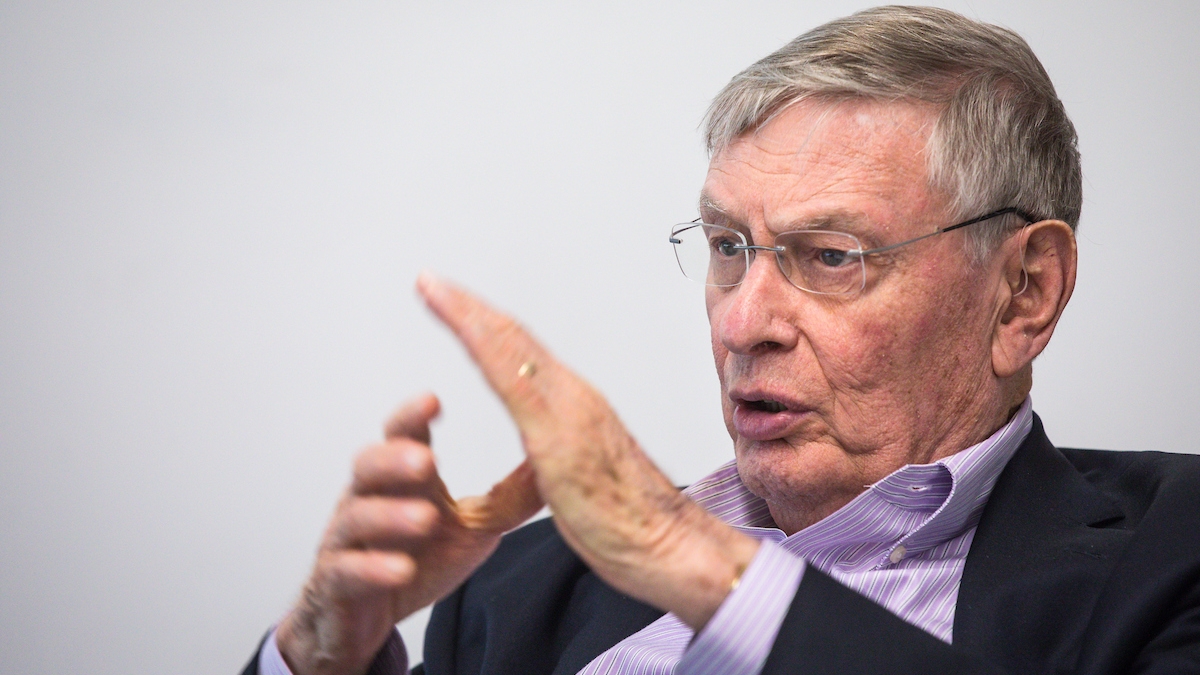Allan H. “Bud” Selig sits inside the Beus Center for Law and Society before the last session of the Arizona State University course he’s teaching, and he wants to talk.
Not about baseball or the many milestones in his nearly 50-year careerSelig has been involved in Major League Baseball since 1970 and served as acting commissioner in 1992 before being named official commissioner in 1998. He helped shepherd the game into the modern era before retiring in July 2015.; the former Major League Baseball commissioner wants to reflect on matters much bigger than sports.
“I do love teaching, and the interaction with my students is just remarkable,” Selig said Friday from ASU’s Downtown Phoenix campus. “I feel fortunate and am grateful that I’m able to impart the knowledge and experiences that I’ve had.”
In January, Selig began teaching “American Society and Major League Baseball Since World War II,” an eight-week class with the Sandra Day O’Connor College of Law that examined the ways in which baseball reflected deeper-running currents in postwar America.
Some of the topics he broached in class — race, culture and the power of baseball as a social institution — could be seen as a curveball to some.
Sports Law & Business Program in 2016.
“Baseball, as I’ve often said to my students and to owners, is a social institution with enormous social responsibilities. I’m very proud of the role that baseball has played in American society.”
Selig starts his course with Jackie Robinson’s breaching of the “color bar” in 1947; geographical franchise shifts from the East to the West Coast; the cultural impact of the 1960s on the sport; and the growing cadre of Latino MLB players from outside the United States.
“It’s important for people to understand what baseball does and doesn’t do,” Selig said. “But it has impacted and changed society, and oftentimes people don’t understand how MLB has played a role in all of this. You can’t believe it unless you study these issues.”
Selig’s class also sinks its teeth into the stuff sports junkies want to know: shifting media relations, questions of franchise location, finances on stadium construction, strikes and free agencies, and current trends in baseball.
Sarah Wetter, one of approximately 20 students who took the LAW 791 course, called Selig’s class the highlight of her semester.
“It has been incredible to hear the stories about his interactions with players such as Derek Jeter that I have spent my life idolizing,” Wetter said. “Even though I will not likely pursue a career in sports law, I learned so much that it will impact my future.”
Like many of his students, the Milwaukee native and part-time Valley resident was an ardent fan of the sport growing up. As an owner, Selig experienced the cultural, political and economic upheavals of the 1970s and 1980s, labor conflicts, increasing competition from the National Football League, and the reframing of the game’s business model.
As MLB commissioner, he experienced the tumult of strikes and steroids, as well as the revitalization and globalization of the sport. He said he had to develop skills to deal with the present as well as keep an eye on future trends.
“That’s a tough skill, and it’s called vision,” Selig said. “I knew when I took over in 1992, baseball was really going to need vision in order to survive. Life was changing, the sport was changing and we had to do some things that baseball would have never considered doing before … and we did them.”
Under Selig’s watch, Major League Baseball expanded the wild-card format, instituted inter-league play, implemented instant replay, brokered a labor agreement with the Players’ Association that resulted in 21 years of peace, developed revenue sharing that led to greater competitive balance and crafted one of the most comprehensive drug-testing policies in professional sports.
Glenn M. Wong, executive director of the Sports Law and Business Program, said Selig’s class has left a lasting impression on students.
“To hear him share his perspective as the commissioner has been nothing short of amazing,” Wong said. “This is indeed a once-in-a-lifetime opportunity for the students, and they have embraced it enthusiastically.”
Selig said he plans on returning to ASU in the fall and teaching “American Society and Major League Baseball Since World War II” again.
“When I was a kid in college many years ago, I wanted to be a history professor,” Selig said. “So here I am now late in my career, and I’m a history professor.
“It’s been a more rewarding experience than I had ever believed. I love teaching, and I’m sorry it’s over.”
Top photo: Former Major League Baseball Commissioner Bud Selig talks about teaching at ASU on Friday on the Downtown Phoenix campus. He is the Sandra Day O’Connor College of Law Distinguished Professor of Sports in America in the Sports Law & Business program, where he just concluded the course "Major League Baseball Since World War II." Photo by Charlie Leight/ASU Now
More Law, journalism and politics

ASU Law to honor Africa’s first elected female head of state with 2025 O’Connor Justice Prize
Nobel Peace Prize laureate Ellen Johnson Sirleaf, the first democratically elected female head of state in Africa, has been named the 10th recipient of the O’Connor Justice Prize.The award,…

Native Vote works to ensure the right to vote for Arizona's Native Americans
The Navajo Nation is in a remote area of northeastern Arizona, far away from the hustle of urban life. The 27,400-acre reservation is home to the Canyon de Chelly National Monument and…

New report documents Latinos’ critical roles in AI
According to a new report that traces the important role Latinos are playing in the growth of artificial intelligence technology across the country, Latinos are early adopters of AI.The 2024 Latino…
